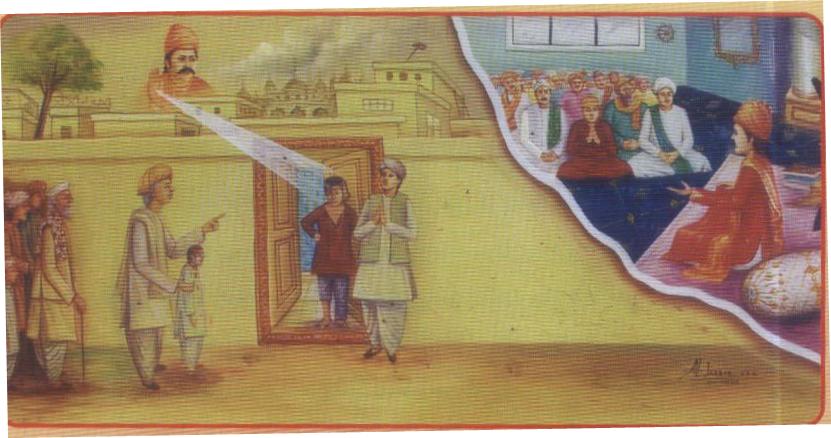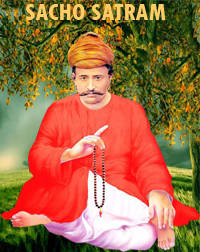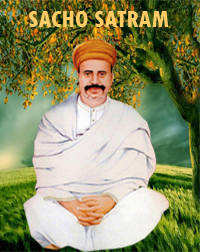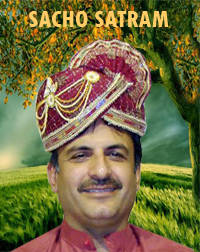
The leader of Nasirabad, Sadoromal Awatrai Ahuja, approached Shahanshah Satguru Sant Sai Satramdas Sahib with a heavy heart. He expressed his deep concern and unhappiness about his son Kishore Kumar’s unacceptable behavior, which was causing him much distress.
Sadoromal expressed to Sant Satramdas Sahib that he is tired of apologising for his son’s violent and unacceptable behaviour. Kishore’s habit of using filthy language and raising his hands on family members over minor issues has caused everyone to live under stress. Even the taste of food is not exempt from his anger, as he would pick fights with family members if he did not get his preferred choice of food.
Sadoromal admitted that he sometimes gets ill thoughts in his mind about his son due to his cruel behaviour. He even wishes that either he or his son would die so that there could be peace. Seeking help, he requests Sant Sai Satramdas Sahib’s guidance in overcoming this difficult situation.
Shahanshah Satguru told Sadoromal that he should give blessings, not curses to his son.” Sadoromal replied that his son did not possess a single good quality, and it was impossible for him to speak well of him. He begged Sant Satramdas Sahib to do something about his son.
Sant Satramdas Sahib reiterated that one should never speak ill of their children, even if their behavior was unacceptable. However, Sadoromal insisted that his son had done so much wrong to them that they could only curse him and not speak well of him.
To this, Sant Sai Satramdas Sahib advised Sadoromal that he should tell anyone who came to complain about his son that everything would be alright, and his son’s behaviour was changing for the better. His words were powerful and divine. Sadoromal was filled with hope and peace and returned home with newfound faith.
Upon Sadoromal’s return home, he was taken aback to find an irate crowd waiting for him at his doorstep with an injured child in tow. They informed him that his son, Kishore, had thrown a stone at the child and injured him. Remembering the advice of Sant Satramdas Sahib, Sadoromal reassured the people that his son was changing and would soon become a kind person. He mentioned that these were the words spoken by Sant Satramdas Sahib about his son, and upon hearing this, the people dispersed.
When Sadoromal entered the house, he was met with complaints about Kishore’s behavior from all his family members. However, he shared with them the message of hope given by Sant Satramdas Sahib and started blessing his son instead of cursing him. This miraculous change in Sadoromal’s approach towards his son brought about a change in Kishore as well. Over time, Kishore became calmer and more composed.
A week later, Kishore approached his father and expressed his unease, stating that he did not like anything and did not feel like talking to anyone. Sadoromal attributed this transformation in his son to the blessings of Sant Satramdas Sahib and suggested they go together to Raharki Sahib for the divine darshan of Sant Satramdas Sahib.
Sadoromal and his son Kishore visited Sant Satramdas Sahib and humbly touched his lotus feet. They decided to stay in Raharki Sahib, and every day Kishore spent time in the company of Sant Satramdas Sahib. The once-violent young man started meditating regularly and replaced his bad language with loving words. He also began serving the community at the Sant Satram Dham temple.
Over time, Kishore’s positive transformation became apparent to everyone, and people started to admire him. Sadoromal was amazed by the changes in his son and approached Sant Satramdas Sahib to inquire about the sudden transformation in Kishore’s behaviour.
Sant Satramdas Sahib spoke about the importance of using our hands for good and leading a responsible life. He explained that our hands make us humans and that we should use them to work hard and become self-sufficient rather than relying on others. He stressed that our second duty is to serve others by respecting elders, being hospitable to guests, and taking care of those in need.
As we grow older, we gain experience and become heads of households, which is a higher position. This position is given by God and is filled with divine power and blessings. When elders bless younger people, their hands are filled with God’s love and kindness, which is why blessings are so powerful. Our hands have three divine qualities: working hard, serving others, and giving blessings, and we should perform our duties based on our age and position.
Saijan explained that it is the responsibility of the young ones to serve and respect their elders, while the elders should always bestow blessings upon the young ones. He further added that God has bestowed us with human form so that we can give, not take. Whenever we give something to a person in need, be it food or anything else, we experience inner peace and happiness. On the other hand, begging from others makes us feel guilty and ashamed.
As humans, we must learn to give and not take. Youngsters should always show respect to their elders, and the elders should shower love and blessings upon the young ones. The problem arises when we start expecting things from each other instead of giving. Youngsters expect love and blessings from elders, while elders expect respect from the youngsters. These expectations create a sense of entitlement and make us beggars, which ultimately leads to conflicts and disagreements.
Saijan pointed out that the same situation happened between the father and son, where the son lost respect for his father, and the father stopped giving him blessings. However, when the father did his duty and blessed his son, the son started respecting him again. He emphasised that one should not become a beggar for love and blessings, but should perform their duty according to their position and not expect anything from others. In doing so, one will automatically receive the things they deserve.
After spending some time at Sant Satram dham and accepting NAAM DAAN from Sant Satramdas Sahib, Sadoromal and Kishore returned to their city. Kishore, who used to pick fights with everyone, had a remarkable transformation. He started loving and serving others instead of fighting and taking things from them. This change in him was so apparent that even those who used to hate him began to love him. The teachings of Saint Satramdas Sahib had a profound impact on everyone, and people started following his teachings of hard work, selfless service, and giving blessings.
One of the most significant changes was that the young ones started respecting their elders without expecting anything in return, and the elders started giving blessings to the young ones without expecting any respect. Everyone began to perform their duties and make heaven on earth by creating an atmosphere of good character, love, and respect.
It is the duty of the young ones to respect their elders without expecting anything in return, as love and blessings will come to them without asking. Similarly, elders should keep giving blessings to the young ones without expecting them to take care of them or show respect, as by their blessings, the young ones will always show respect and love.
May the blessings of Shehenshah Satguru Sant Sai Satramdas Sahib continue to shower upon all of us, and may humanity become rich with good character, love, and respect. May humans create a safe and happy future for themselves and their future generations.



